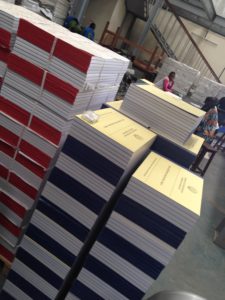Ensuring the Availability of Life-Saving Commodities in a Fragile State
In December 2013, the fragile peace that held the newly independent country of South Sudan collapsed into renewed fighting. Since then, violence has led to massive outflows of people to nearby Ethiopia and the economy has steadily deteriorated in the absence of oil revenues. Throughout this period of political uncertainty, population displacement and economic catastrophe, the United States Agency for International Development (USAID)-funded Systems for Improved Access to Pharmaceuticals and Services (SIAPS) has continued to work with South Sudan’s health workers to strengthen its fledgling health system.
In resource-limited settings such as South Sudan, managing information holds the key to maximizing resources to ensure the availability of high-quality essential medicines and supplies, such as artemisinin-based combination therapies (ACTs), antiretrovirals (ARVs), and maternal and child health (MCH) and family planning (FP) products—a high priority for achieving desired health outcomes in South Sudan. SIAPS is playing a crucial role in enhancing capacity for pharmaceutical supply management and services, and ensuring the availability of life-saving commodities.

Strengthening the Government’s Capacity to Manage Pharmaceutical Supplies
SIAPS’s approach to strengthening capacity for pharmaceutical management begins with building consensus among stakeholders to identify areas for improvement. Working with South Sudan’s Ministry of Health (MoH), it was clear that the pharmaceutical sector needed more robust pharmaceutical management information system (PMIS) tools. Better alignment of these tools promotes the more efficient management of pharmaceutical supplies.
This restructuring is particularly important for the Emergency Medicines Fund (EMF), which was initiated as a result of frequent shortages of essential and life-saving medicines and supplies in all South Sudanese health facilities. Resources from USAID, the United Kingdom Department for International Development (DFID), and the Norwegian government were pooled to procure a consistent supply of essential medicines and supplies. Collaborative reviews, timely distribution and rigorous management of PMIS tools is necessary to effectively manage these life-saving medicines and avert potential health crises related to supply shortages.
The Need for Good Data
The current push system of pharmaceutical management, which allocates medical supplies from the central level to the lower levels of the health system, has led to systemic inefficiencies, including both oversupply and supply shortages, and huge stocks of expired products. As a result, the MoH plans to shift to a pull system in which medical supplies will be distributed based on actual consumption information provided by the lower-level facilities. The MoH’s efforts, however, have been hampered by the scarcity of reliable data that can help ensure effective decision-making. Dr. Victor Furangi, director-general of Western Equatoria State, emphasized the importance of effective data collection, saying, “It’s certain that we cannot manage the commodities at our health facilities without the availability of the necessary tools and trainings to go with its use.”
The SIAPS team responded to the need for more reliable data by working with the MoH to review the tools: stock cards; dispensing registers; issue, receipts, and requisition vouchers; monthly reports; and prescription forms for effective pharmaceutical management at the service delivery level. In all, 37,220 PMIS copies of agreed-upon forms were printed. Dr. Martin Swaka, USAID’s Health Program Specialist, stated, “USAID sees the need for these tools to be reviewed and printed and we are very excited to see them printed on time and with such high quality. We hope the tools will immediately be made available for use in the facilities in Western and Central Equatoria States.”
The next phase of the project will be distributing the materials and training health workers to quickly and accurately collect and report medicine consumption data up to the national level. Coordinating mechanisms will be instituted at all levels to ensure complete, accurate, and timely functioning of information systems.
Partnerships Matter: Expanding our Reach
It is clear that the challenges facing information management systems in South Sudan will require cooperation among a number of organizations. For this reason, SIAPS has collaborated with other partners, including the South Sudan Health Pooled Fund (HPF) and IMA World Health, to print the agreed-upon PMIS tools to ensure that the states in which they work also have similar capacities for training health workers in and carrying out effective pharmaceutical management. With these important steps, SIAPS is helping to eliminate a major barrier to the implementation of a pull system of pharmaceutical management in South Sudan, which will better direct scarce medical resources.

